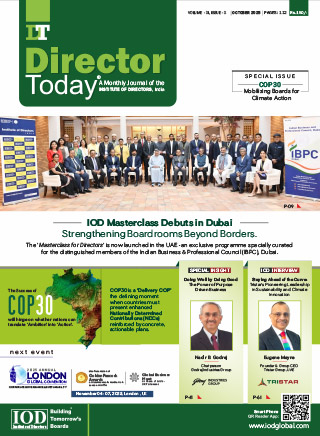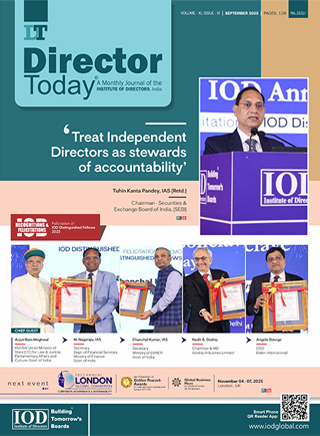A Report on 2025 Annual Directors' Conclave & 35th IOD Annual Day
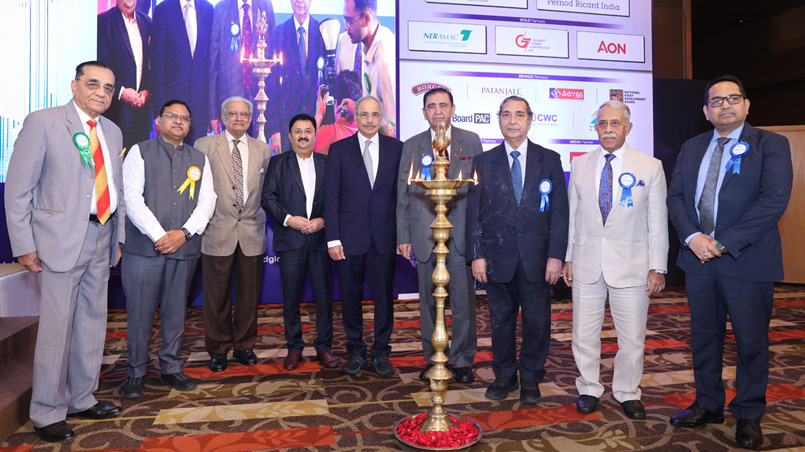
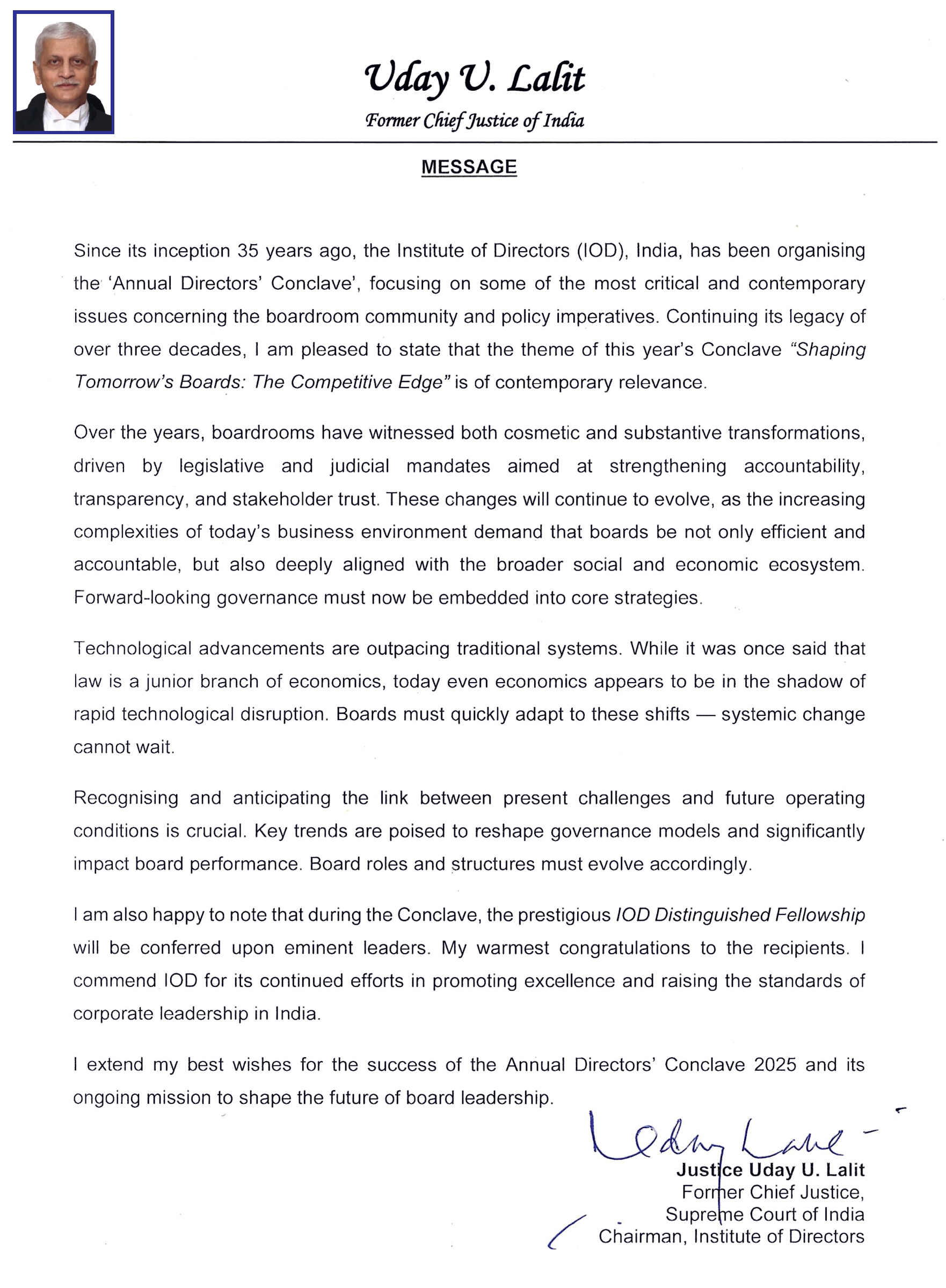
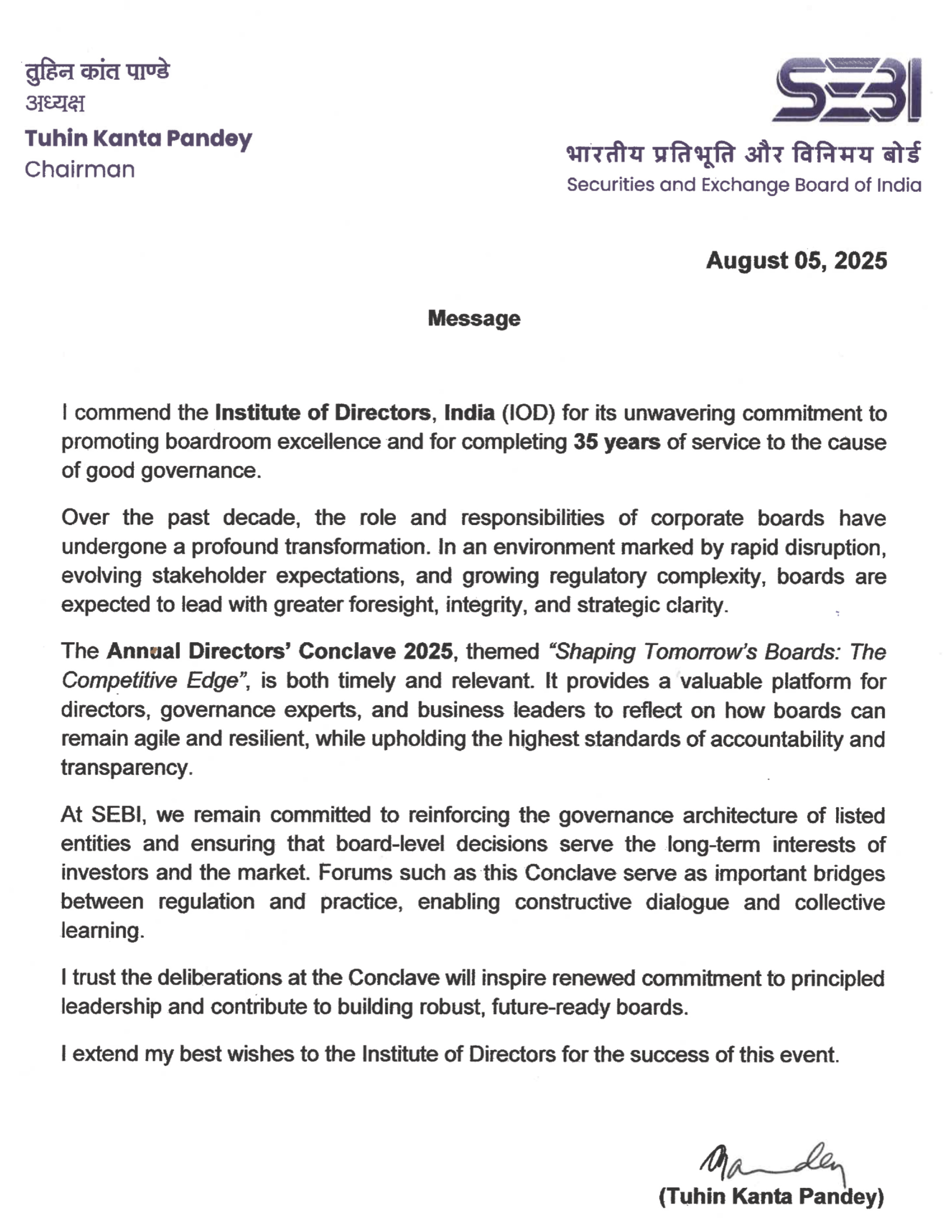
The Institute of Directors (IOD), India hosted the 2025 Annual Director's Conclave and celebrated its 35th Annual Day on Friday, August 08, 2025, at Hotel Le-Meridien, New Delhi. The Theme for this year's conclave was: 'Shaping Tomorrow's Boards: The Competitive Edge'. The all-India gathering aimed to explore the evolving demands of corporate governance. It was designed to equip the senior executives, board members, and governance professionals with actionable insights on navigating disruption and driving sustainable value in an era of rapid change.
The Conclave witnessed an impressive lineup of distinguished speakers and dignitaries. It was a one-day high level event largely attended by around 400 delegates including directors, industry experts, government officials and business leaders from all over India. Among them were the Hon'ble Union Minister of State for Law & Justice and Parliamentary Affairs, Mr. Arjun Ram Meghwal; SEBI Chairman, Mr. Tuhin Kanta Pandey, IAS (Retd.); Chairman of UAE & Gulf, Institute of Directors, H.E. Dr. Tayeb Kamali; IOD Chairman, Hon'ble Justice Uday U. Lalit; IOD Vice-Chairman, Hon'ble Justice Ritu Raj Awasthi, Ex-India's G20 Sherpa & former CEO, Niti Aayog, Mr. Amitabh Kant, IAS (Retd.), Chairman - National Dairy Development Board (NDDB) and Board Member, International Dairy Federation, Dr. Meenesh C. Shah; Executive Board Member & National Head Pernod Richard India,
Mr. Prasanna Mohile, and CA Charanjot Singh Nanda, President, The Institute of Chartered Accountants of India.
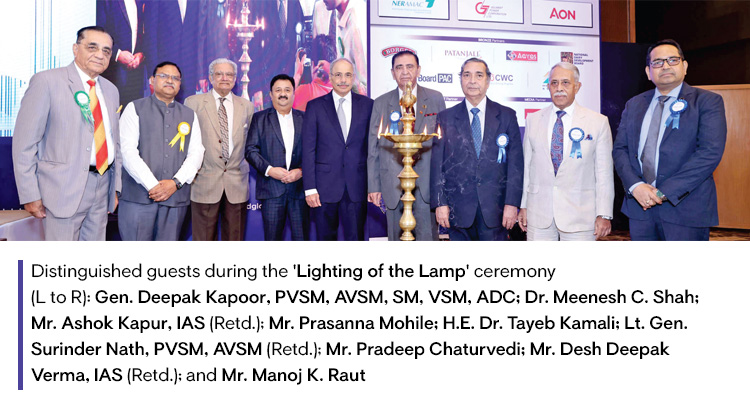
As a part of the Annual Day celebration IOD also conferred the Distinguished Fellowships 2025 on notable leaders and visionaries who also graced the event. These leaders included:
1. Mr. M. Nagaraju, IAS
Secretary
Dept. of Financial Services, Ministry of Finance Govt. of India
2. Mr. Chanchal Kumar
Secretary, Ministry of Development of North Eastern Region (DoNER)
Govt. of India
3. Mr. Nadir B. Godrej
Chairman & Managing Director
Godrej Industries Ltd.
4. Mr. Angelo George
Chief Executive Officer
Bisleri International
The conclave featured plenary sessions, keynote address, and panel discussions focusing on topics such as the board's strategic foresight, Sustainability issues, emerging technologies, and Corporate Governance resilience.
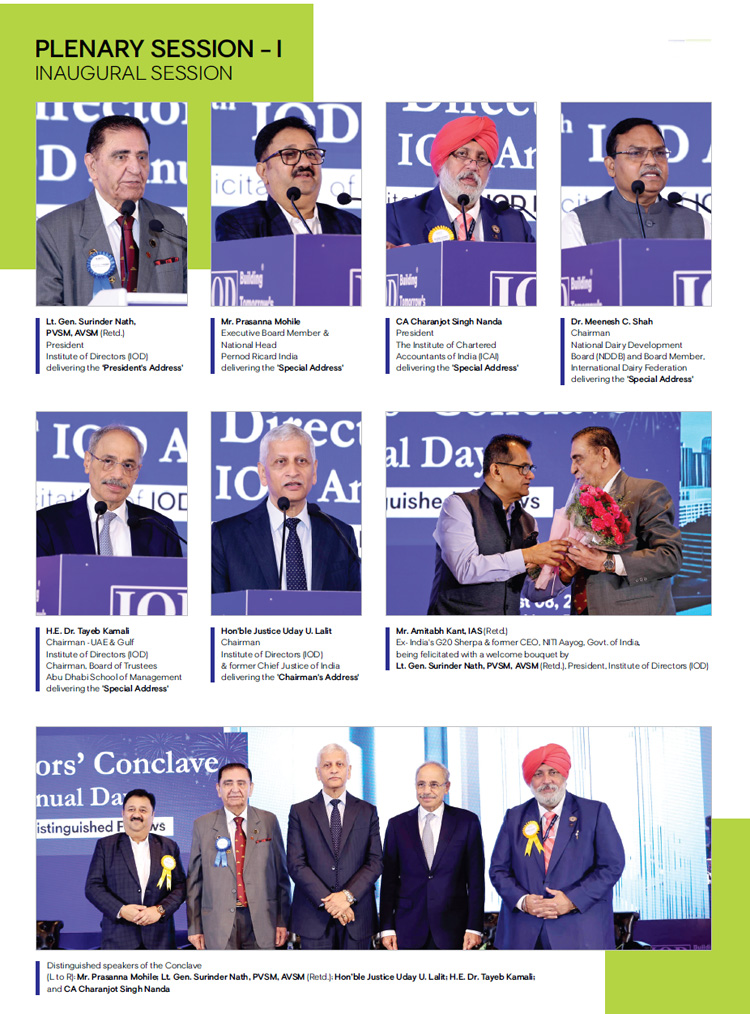
PLENARY SESSION - I
INAUGURAL SESSION
The Inaugural Session commenced with the ceremonial lighting of the lamp by the esteemed guests of the session.
The 'Welcome Address' was delivered by:
Lt. Gen. Surinder Nath, PVSM, AVSM (Retd.)
President - Institute of Directors (IOD)
Lt. Gen. Nath extended a warm welcome to the assembled dignitaries, esteemed speakers, and delegates at the Conclave. He underlined some of the key questions to be addressed during the Event and elaborated on the theme, “Shaping Tomorrow's Boards: The Competitive Edge.”
He highlighted that the corporate world is experiencing rapid technological, geopolitical, and sustainability-driven changes, making adaptability crucial. In this evolving landscape, he said that boards must embrace a mindset shift—from reactive to proactive, from isolated decisionmaking to holistic thinking, and from short-term gains to sustainable value creation.
Additionally, he called attention to the digitization of governance processes, the use of AI in board analytics, and the growing adoption of virtual boardrooms. He also focused on the emerging dimensions of future boards, including the rise of digital governance, enhanced board diversity, cognitive inclusivity, real-time transparency, and dynamic accountability. The President further emphasized that businesses must operate across multiple jurisdictions and governance frameworks, becoming globally fluent. He asserted that the future of governance lies in preparing the next generation of board leaders today.
Boards must now become future-ready-in Composition, Competence, and Culture. The challenges of the 21st century demand a broader spectrum of skills. Cybersecurity, sustainability, geopolitics, digital transformation, and stakeholder engagement have all become critical board-level issues.
His address concluded with a call to shape boards that are agile, morally courageous, strategically focused, and socially accountable, positioning governance as a true competitive edge in building a resilient, equitable, and sustainable future.
This was followed by a 'Special Address' delivered by:
1. Mr. Prasanna Mohile
Executive Board Member & National Head
Pernod Ricard India
2. CA Charanjot Singh Nanda
President
The Institute of Chartered Accountants of India
3. Dr. Meenesh C. Shah
Chairman
National Dairy Development Board (NDDB) and Board Member, International Dairy Federation
4. H.E. Dr. Tayeb Kamali
Chairman - UAE & Gulf, Institute of Directors (IOD), India
Chairman, Board of Trustees
Abu Dhabi School of Management, UAE
Mr. Mohile described the Event's theme as not only relevant but urgent. Drawing from his own experience, he said that he had observed a significant shift in boardroom dynamics, where CSR and ESG, once treated as margins, have now become core mandates. In a world where organisations are increasingly shaped by external forces, he stressed that boards can no longer afford to remain passive. Further sharing a personal experience, he recalled how he came to realise that creating “good times and good places” cannot be limited to CSR initiatives but must be about building long-term resilience. He outlined the attributes boards must embody today - Agility, Accountability, and Attentiveness to the voices that matter.
Mr. Mohile concluded by stating that boards are not merely about Governance but about legacy. In his view, the true measure of competitiveness lies not in market share but in mindsets, and if we aim to shape tomorrow's boards, we must begin by reshaping today's boardroom dialogue.
Mr. Nanda delivered a thought-provoking address on the Event's theme, opening with the quote: “A board's role is not just to steer the ship, but to ensure it navigates towards the right horizon with innovation, foresight, and adaptability.” He emphasized the importance of 'Non-Financial Reporting', highlighting that boards can only remain strong by prioritizing environmental responsibility, governance, and sustainable practices that shape global performance.
Introducing the Institute of Chartered Accountants of India (ICAI), he posed an insightful question: What prompted the Constituent Assembly to establish ICAI? His answer: the nation sought a disciplined force to lead India toward perpetual growth and advancement. He further outlined ICAI's and SEBI's initiatives to further strengthen the boards. Mr. Nanda then stressed on the power of data and the critical role of internal audit committees in ensuring transparency and creating value for boards. He also addressed the issue of gender diversity, acknowledging the increasing presence of women on boards while urging a further rise in representation to achieve true inclusivity and enrich boardrooms with diverse perspectives. He concluded with the commitment of ICAI for stronger governance, with diversity, technology, profitability with purpose, board renewal and upholding trust in public institutions.
Dr. Shah, emphasized that in today's dynamic environment boards must move beyond traditional approaches to governance and adopt a renewed perspective. He highlighted initiatives aimed at strengthening grassroot institutions, including the federal structure of NDDB. He also mentioned some schemes launched in collaboration with the Government of India, such as the 'White Revolution' and its recent extension, 'White Revolution II'.
He noted that India's success in the Dairy sector was driven not by large corporations but by millions of small dairy farmers, reinforcing the cooperative model's role in this achievement. He then outlined some unique qualities that make cooperative boards successful - Accountability, Participatory Governance, Transparency as a core value, and a strong sense of ownership. He concluded by emphasizing on fostering a sense of purpose for attracting and retaining consumers and employees.
H.E. Dr. Kamali emphasized on the transformative role of Artificial Intelligence (AI) in shaping future success, noting that AI is no longer optional but increasingly central to business strategy. He urged boards to leverage AI as a catalyst for sustainable and competitive advantage, acknowledging its presence in nearly every aspect of today's work environment. He highlighted, governance should not be seen as a hurdle, but as a fence around the playground, enabling bold innovation within a secure framework. Stressing the need for AI Literacy at the Board-level, he encouraged directors to engage with current research, identify critical gaps, and shift from reactive to strategic thinking on AI adoption. As stewards of purpose and longevity, Mr. Kamali underlined a clear mandate for 2025: "Lead boldly with oversight, build knowledge and structure, uphold principles, and shape boards into architects of sustainable competitive advantage rather than mere overseers." He concluded with a powerful call to action to ensure that AI is not only adopted, but also governed with intent, aligned with strategy, and executed with foresight.
This was followed by the ‘IOD's Chairman Address' delivered by:
Hon'ble Justice Uday U. Lalit
Chairman, Institute of Directors (IOD)
former Chief Justice of India
Justice Lalit opened his address with a Sanskrit couplet that translates to: “There is not a single word in any dictionary that cannot be utilized in a mantra; every herb or plant can be used as medicine; there is not a single person who is incapable, but what is rare is those who organize and manage.” He explained that this is precisely where an institute like IOD plays a pivotal role, in nurturing the talent and empowering the Independent Directors, who similarly represent that rare breed of leaders. He then reflected on the prophetic vision behind the formation of ICAI, noting that it was established to outline a governance regime and act as a watchdog over corporate entities while simultaneously upholding public interest. Highlighting India's demographic advantage as a young nation, he then emphasized the immense human potential that can shape the country's future. He concluded by commending IOD's efforts, he applauded initiatives like this Conclave, and for their role in shaping future boards and strengthening governance structures.
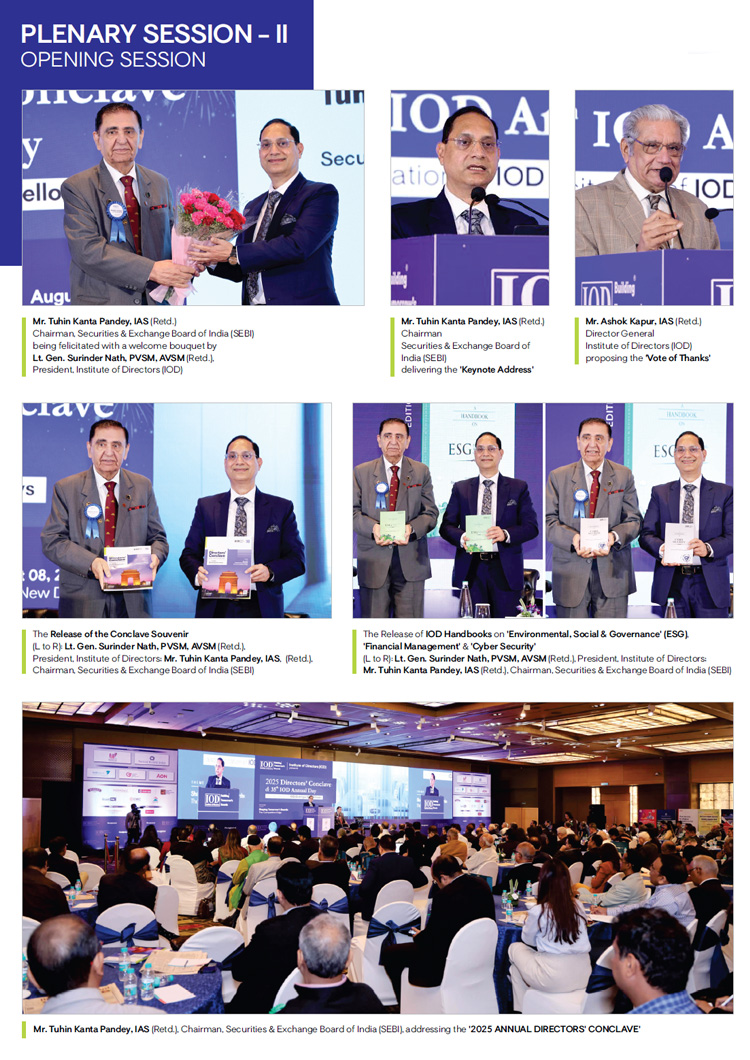
PLENARY SESSION - II
OPENING SESSION
The 'Welcome Remarks' in the Session were delivered by:
Lt. Gen. Surinder Nath, PVSM, AVSM (Retd.)
President, Institute of Directors (IOD)
Lt. Gen. Nath, opened the session by acknowledging the presence of Mr. Tuhin Kanta Pandey, IAS (Retd.) who recently assumed charge as the Chairman of the Securities and Exchange Board of India (SEBI). Mr. Pandey's illustrious career included serving as the Union Finance Secretary, Revenue Secretary, Secretary of the Department of Investment & Public Asset Management (DIPAM), Secretary of the Department of Public Enterprises, and Secretary at the Department of Personnel & Training (DoPT), and also served at the United Nations Industrial Development Organisation (UNIDO) in its Regional Office, showcasing his global perspective and administrative acumen.
The 'Keynote Address' was delivered by:
Mr. Tuhin Kanta Pandey, IAS (Retd.)
Chairman - Securities & Exchange Board of India (SEBI)
Mr. Pandey spoke about redefining an Independent Director's role. He urged all of them to freely dissent and question relevant information and highlighted the importance of diverse views for making a strong Board. He said India has made remarkable progress in Good Governance, which is no longer just about policies but about the tone, behaviour and values in action. He also highlighted that SEBI had progressively deepened the framework for corporate governance over the past two decades. Beyond structural mandates, he said that these frameworks convey core principles that capture the spirit of effective board conduct. It called upon Independent directors to act with integrity and purpose, to question and engage with executive management without bias or hesitation, and to offer thoughtful scrutiny of strategy and risk, he further noted.
The SEBI chief pressed for diversification in independent director appointments, across experience, various sectors, and demographics, and backed by ongoing orientation on AI governance, cyber threats, and ESG disclosures.
On Independent Directors, Mr. Pandey said, IDs can no longer be regarded “honorary appointees” or “friendly critics”, but they must evolve into active stewards of Accountability.
This was followed by Release of Conclave Souvenir & Release of the IOD Handbooks on 'Environmental, Social & Governance' (ESG), 'Financial Management' & 'Cyber Security'.
This was followed by a 'Vote of Thanks' proposed by:
Mr. Ashok Kapur, IAS (Retd.)
Director General
Institute of Directors (IOD)
Mr. Kapur concluded the Inaugural Session by proposing a 'Vote of thanks', addressed to all the dignitaries present in the Conclave, from all over India. He showed confidence in their valuable insights and wisdoms, that they will be a fruitful guide to the assembled audience in their future endeavours to prepare boards of tomorrow.
Citing Mahatma Gandhi and the UN Sustainable Development Goals (SDGs), the Address positioned conscience-led governance as a national obligation, particularly in climate stewardship, CSR, and ethical leadership. India's pioneering initiatives like Swachh Bharat Mission, carbon trading markets, Green Credit Programme, and Mission LiFE, were showcased as examples of integrating ecology with economy by him.
He concluded with Noble Laureate Albert Schweitzer's reminder that example is the most powerful influence; the Address called for boards to be “not just strong, but just; not just profitable, but principled,” making the conclave a call to action rather than just a mere debate or discourse.
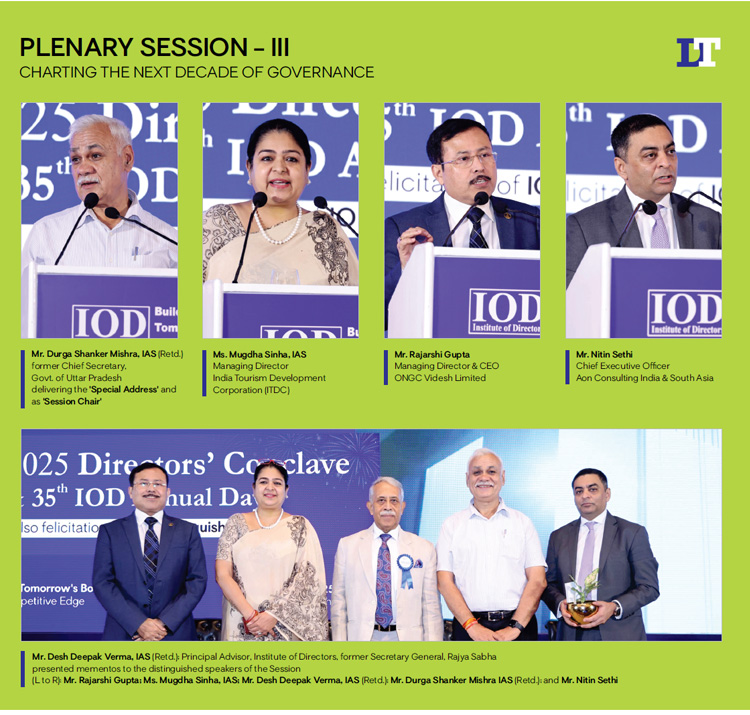
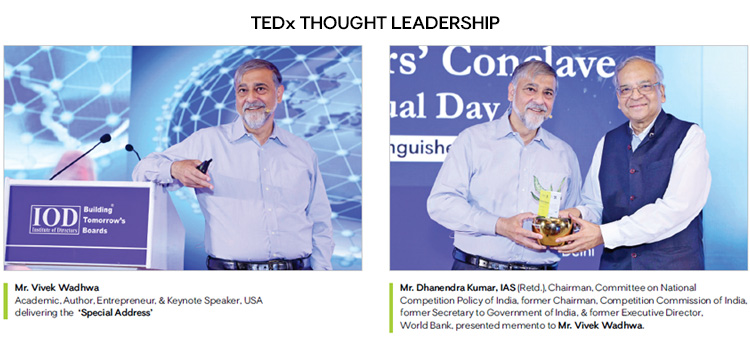
PLENARY SESSION - III
CHARTING THE NEXT DECADE OF GOVERNANCE
The session was 'Chaired' by:
Mr. Durga Shanker Mishra, IAS (Retd.)
former Chief Secretary
Govt. of Uttar Pradesh
The session had the following other Speakers:
1. Ms. Mugdha Sinha, IAS
Managing Director
India Tourism Development Corporation (ITDC)
2. Mr. Rajarshi Gupta
Managing Director & CEO
ONGC Videsh Limited
3. Mr. Nitin Sethi
Chief Executive Officer
Aon Consulting India & South Asia
Mr. Mishra, Chaired the session, underscoring its significance for both the public and private sectors. He emphasized their shared responsibility in working towards the vision of a Viksit Bharat by 2047. Highlighting key drivers of Corporate Governance in today's fast-paced and dynamic economy, he applauded Prime Minister Narendra Modi's efforts in steering India towards becoming an ESG and CSR ready economy, strengthening the nation to its position as the world's fourth-largest economy, and moving confidently towards an Atmanirbhar Bharat, despite challenges such as the COVID-19 pandemic. He noted that the journey to Viksit Bharat will focus on two critical pillars:
a) innovation, and
b) the growth of startups.
Mr. Mishra further stressed that the focus should extend beyond “Make in India” to “Make for the World.” Concluding his remarks, he reaffirmed India's commitment made at COP27 to achieve 'net-zero' emissions by 2030, calling for an approach that is experiential, resilient, sustainable, and responsive to the challenges of climate change.
Ms. Mugdha opened her Address introducing the Indian Tourism Development Corporation (ITDC) and its achievements over the past six decades. She spoke about transforming the organization into an anti-fragile institution, resilient in the face of multiple challenges. Emphasizing the need for clarity, agility, and critical thinking in decisionmaking, she traced India's evolution from the Industrial Revolution to Industry 4.0, and from MIS technologies to the era of digital technologies. Drawing on a vivid analogy, she linked India to a hydroponic lotus, which is thriving even amidst geopolitical crises. She then highlighted the phrase “Vikas bhi, Virasat bhi”, while drawing parallels between the international tourism circuit and the national pilgrim tourism circuit, she underlined the vast potential for growth and development within the latter. She concluded by outlining the strategies that business units should adopt and highlighted the future goals and programmes of the ITDC.
Mr. Gupta's address focused on the pivotal role of Energy in driving economic growth. Energy, according to Mr. Gupta feeds the GDP of our nation. He stressed on the principle of “Produce More with Less”, which means, maximizing output while minimizing carbon emissions, and highlighted Prime Minister Modi's vision of positioning India as a leading gas-based 'energy basket'.
He also raised some thought-provoking questions on ethical leadership and governance, emphasizing the importance of effectively navigating change. Mr. Gupta then underlined the need to empower today's youth through digitization and ethical AI, while stressing the critical role of data ethics, responsibility, and transparency. He cautioned that without a strong ESG orientation, progress will come to a standstill, making adaptability a necessity.
In his concluding remarks, he reaffirmed ONGC's commitment to achieving net-zero emissions by 2030 and contributing to the vision of 'Viksit Bharat', with energy at its core.
Mr. Sethi centered his address on the pivotal role of boards, not only in steering organizations through disruption, but also in ensuring that “how” we lead is as strong as “what” we deliver. He emphasized that Good Governance is not just merely about safeguarding the enterprises, but also about shaping the future we aspire to lead. He added, that if strategy is where we are going; Governance is how we survive that journey. He then commented on 'responsible capitalism', saying that it is not just about softening the drive for results, but about recognizing that 'value creation' and 'value alignment' are inseparable. He stressed that boards must ensure that incentives promote the right long-term behaviours rather than short-term optics.
He concluded by saying that effective boards go beyond supervising management-they amplify it by aligning on risk management, decision-making roles in crises, and response speed, enabling management to act decisively and boldly without fear of being second-guessed.
This was followed by an Interactive Q&A session with the large audience.
This was followed by a ‘Special Presentation’, made by:
Mr. Vivek Wadhwa
TEDx Thought Leadership Speaker, Academic, Author, Entrepreneur, & Keynote Speaker, USA
Mr. Wadhwa made a presentation on the theme “Directing the Future: AI, Automation, and Accountability”, exploring the vast potential of AI technology across all sectors. Drawing a parallel between today's green cars and the Apollo 11 technology that once flew humans to the moon, he illustrated how technological progress is both exponential and limitless. He noted that AI is currently --“at the tip of the iceberg,” with far greater advancement potentials in the upcoming decades. Emphasising on the role of technology in transforming infrastructure, he urged investors and entrepreneurs to recognise India's potential, not just as a market, but as a hub for solving critical challenges by investing in the country. Turning to the future of modern medicine, he highlighted how major tech companies are shifting focus towards healthcare, which he described as a potential trillion-dollar economy.
Explaining his own journey, he mentioned approaching Prime Minister Modi with an initiative to cure cancer, leading to the creation of an AI-powered diagnostics lab in collaboration with IIT Madras and AIIMS Delhi. He applauded India's abundance of scientific and engineering talent. Mr. Wadhwa also addressed the darker side of AI and technology, concluding with a call for today's directors to take proactive measures to ensure ethical governance and leadership in an increasingly techdriven world.
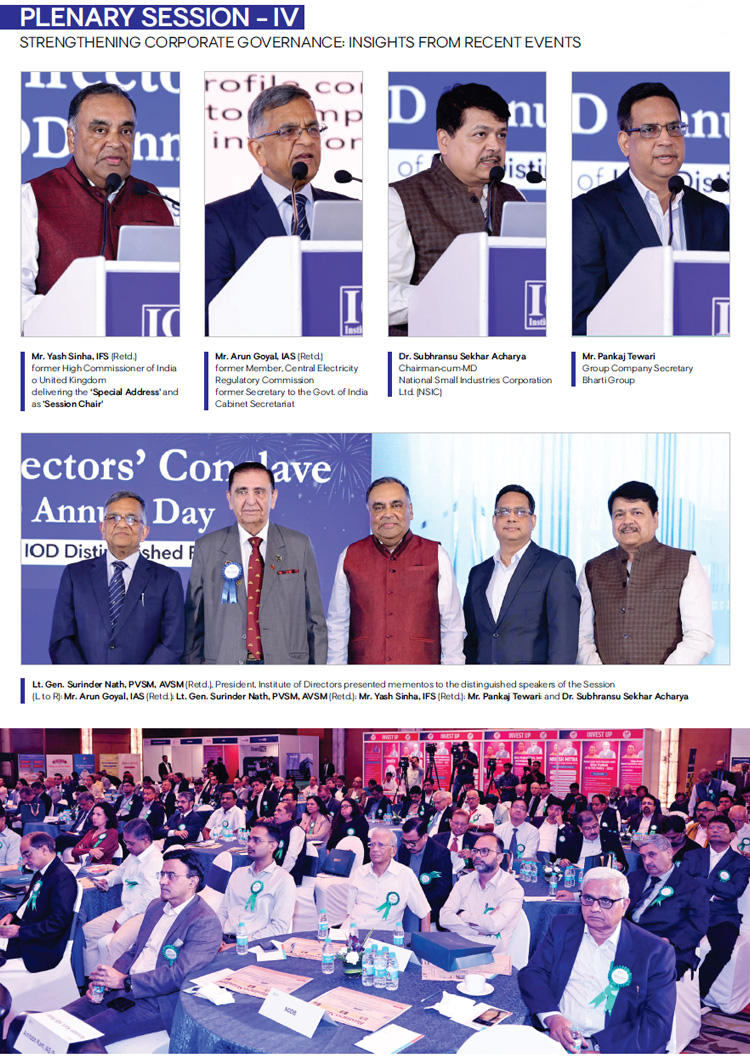
PLENARY SESSION - IV
STRENGTHENING CORPORATE GOVERNANCE: INSIGHTS FROM RECENT EVENTS
This Session was ‘Chaired’ by:
Mr. Yash Sinha IFS (Retd.) former High Commissioner of India to United Kingdom The Session had the following other distinguished speakers:
1. Mr. Arun Goyal, IAS (Retd.)
former Member
Central Electricity Regulatory Commission
former Secretary to the Government of India, Cabinet Secretariat
2. Dr. Subhransu Sekhar Acharya
Chairman-cum-MD
National Small Industries Corporation Ltd. (NSIC)
3. Mr. Pankaj Tewari
Group Company Secretary Bharti Group
Mr. Sinha commenced the session by introducing the theme of the session, “Strengthening Corporate Governance: Insights from Recent Events.” He highlighted the crucial role of the foreign embassies & high commissions in providing exposure to the global markets. Citing examples of successful Indian companies such as Maruti Suzuki and ITC, he commended their exemplary contribution in taking Indian brands to the global stage. He also applauded Prime Minister Narendra Modi's efforts in launching Emergency Management and Research Institute (EMRI) under the name GVK EMRI in Sri Lanka in 2015, noting that the “subah se raat” service became one of the most popular and appreciated initiatives during the COVID-19 pandemic.
Mr. Sinha also pointed to the recent Free Trade Agreement between UK and India and praised the role of Invest India as a key knowledge partner and UKIBC in strengthening India–UK relations. He underscored the need to understand and learn from geopolitical scenarios to enhance decision-making, concluding with the insight that a true competitive edge can only be achieved by directly engaging with people on the ground.
Mr. Goyal's presentation focused on the lessons learnt from recent cases involving Gensol- Blusmart, Byju's, and IndusInd Bank. To strengthen corporate governance, he then made a few suggestions:
• Improving Disclosure & Accountability
• Enhancing Good Governance Practices
• Mitigating Conflicts of Interest
• Combating Fraud & Mismanagement
He also highlighted the significant impact of SEBI's initiatives on corporate governance, including enhanced regulatory oversight and increased responsibilities for Independent Directors. Additionally, he emphasized the need for boards to have diverse expertise to navigate market disruptions and geopolitical risks.
He concluded by emphasizing that it is not just about rules and regulations, but about fostering a culture of integrity, transparency, and accountability at every level of the organization.
Dr. Acharya, highlighted on the role of 'Corporate Governance' in the Indian landscape, tracing its roots through history and referencing the 'Shanti Parv' in the Mahabharata, where guidelines for righteous rule were introduced. He noted that governance is not a new and a modern concept, but integral to the Indian history, citing the Arthshashtra which emphasized on ethical conduct of leadership. He says modern day concepts of governance can be learnt from history. He further put emphasis on instilling stricter governance in MSMEs and startups, highlighting that the market is the ultimate judge, and hence it is very important to study and understand risk management and more importantly, reputational risk.
Dr. Acharya elaborated on MSMEs' role, noting that while many previously unregistered businesses missed out on government benefits, the introduction of the UDYAM Assist platform had largely resolved this issue. He concluded by emphasizing on the importance of staying updated to foster growth, and the critical role of Independent Directors, as voices that strengthens governance which in essence, is nothing but adoption of best practices.
Mr. Tewari emphasized that business success and good governance are interlinked and go hand-in-hand. He went on to highlight that 'Talent Attraction' today is very critical and an important organisational process, since Millennials and Gen X today prefer organizations that go beyond financial growth. He also outlined the key responsibilities of boards:
• Composition: Maintain a balanced mix of executive and non-executive members, with diversity.
• Diligence: Map all laws, functions, and processes accurately; conduct periodic reviews through Internal and External audit to identify and address gaps.
• Culture: Foster positive values and discourage detrimental practices.
He concluded that good corporate governance is integral to the economy, and boards must play a vital role in ensuring it by embracing regulations rather than merely complying with laws.
This was followed by an interactive Q&A session with the large audience.
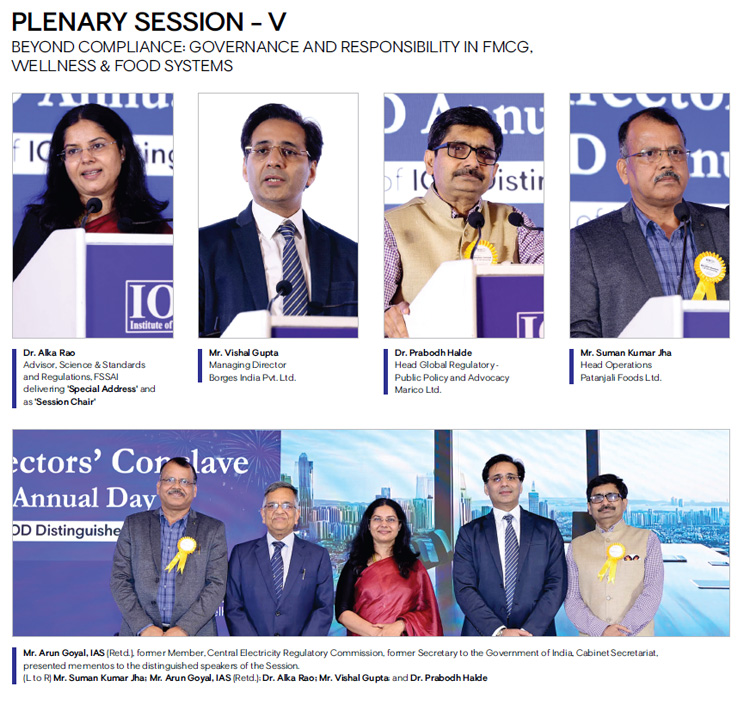
PLENARY SESSION - V
BEYOND COMPLIANCE: GOVERNANCE AND RESPONSIBILITY IN FMCG, WELLNESS & FOOD SYSTEMS
The Session focused on the following key areas:
• Strengthening board-level oversight in aligning product innovation, sustainability, and wellness objectives with long-term corporate strategy and stakeholder expectations.
• Ethical sourcing and responsible marketing to digital traceability and ESG-linked reporting.
• Responding to evolving regulatory standards (including FSSAI) with forward-looking compliance architecture that balances risk, resilience, and innovation.
• Building consumer trust as a governance priority, through enhanced transparency, health-forward disclosures, and a commitment to public well-being.
• Driving integrated thinking at the leadership level, where financial performance, regulatory foresight, and societal impact are governed as interconnected imperatives.
The Session was ‘Chaired’ by:
Dr. Alka Rao
Advisor, Science & Standards and Regulations
FSSAI
The session had the following distinguished speakers:
1. Mr. Vishal Gupta
Managing Director
Borges India Pvt. Ltd.
2. Dr. Prabodh Halde
Head Global Regulatory-Public Policy Advocacy
Marico Ltd.
3. Mr. Suman Kumar Jha Head Operations
Patanjali Foods Ltd.
Dr. Rao's address centered on the evolving expectations of consumers, who are increasingly seeking transparency and authenticity. She stressed that manufacturers must adopt more transparent and ethical sourcing practices, which in turn would ensure better food quality. Highlighting the growing importance of consumer knowledge, she noted that rising allergen awareness is reshaping the food labeling trends in the market.
Underscoring shared accountability, she remarked, “Every consumer is a Food Officer”, emphasizing that food safety is a collective responsibility. According to her everyone from consumers to FSSAI, has a responsibility to play in ensuring food safety.
Shifting her focus to the growth of biotechnology in the food sector, Dr. Rao underscored the Ayurvedic concept of AAHAR, calling it the future and a promising niche in personalized nutrition. She explained that region-specific and season-specific food traditions, when combined with modern innovations, can lead to personalized medicinal foods, which is an area she believed could become a “game-changing industry.”
She concluded by highlighting the pivotal role of regulatory bodies in overseeing labeling and advertisements, noting that these areas offer significant scope for innovation in positioning local brands for global markets.
Mr. Gupta, focused his address on the evolving role of boards in managing businesses. He emphasized that boards should be progressive and adaptive, with a strong commitment to innovation driven by consumer demand, especially in FMCG sector. He noted that innovation begins with consumer insights and ends in delivering effective solutions, adding that any business contributing positively to society inherently ensures its sustainability.
'Traceability' from the farm to the table, as he noted, is a rising priority in the industry. Mr. Gupta commended the FSSAI for its efforts in maintaining food security and surveillance and he urged the organizations to view regulators as partners rather than adversaries, with boards leading the way in fostering this collaborative mindset. He concluded by emphasizing that “trust” is built through sustainable practices, and it is the board's responsibility to uphold this trust by ensuring ethical governance and strict compliance with laws and regulations.
Mr. Halde began his address with a Sanskrit phrase referring to Independent Directors as 'Vidhvaan', which means wise and knowledgeable. He emphasized the shared responsibility of ensuring food safety, commending the FSSAI for its impactful initiatives such as Food Safety Training and Certification (FSCT) and 'Eat Right' India. Urging stakeholders to look beyond mere compliance, he stressed the need to think from a consumer's perspective, and concluded by affirming that everyone has the right to safe, quality food - a vision essential to building a better India.
Mr. Jha, in his address highlighted the central role of 'Trust' as a foundation of a successful business, emphasizing that it must be built in the boardroom rather than advertising rooms. He stressed that consumer trust is achieved through strategic management imperatives, supported by robust Standard Operating Procedures (SOPs). Well-documented processes, he noted, strengthen systems, improve information flow, and foster stakeholder confidence. He highlighted that trust stems from transparency, and that informed and conscious consumers drive ethical sourcing, accountability, and KPI tracking. Profit, he cautioned, should never be the sole purpose of business. Concluding his address, Mr. Jha stated that “trust is the new economy”, it is a nonnegotiable, foundational element for any sustainable organization.
This was followed by an Interactive Q&A session with the audience.
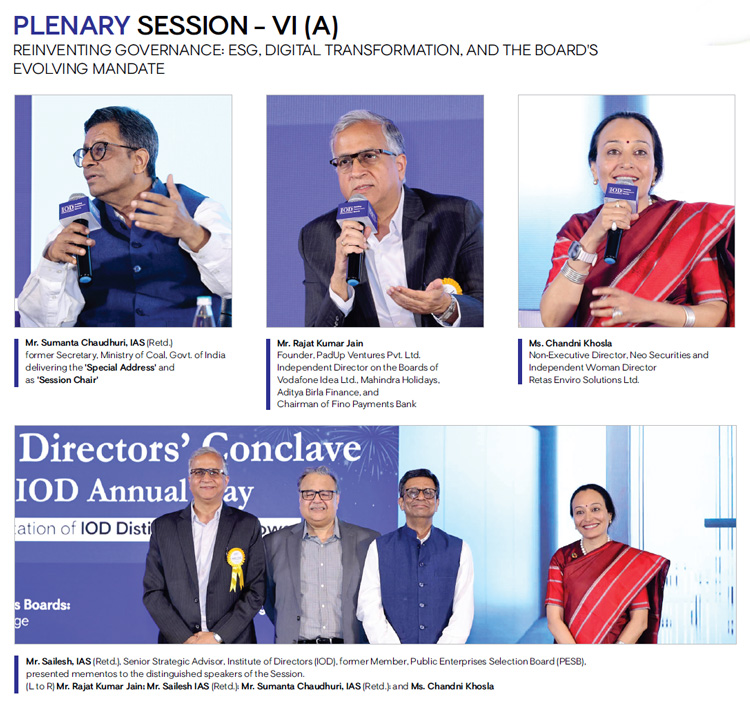
PLENARY SESSION - V (A)
REINVENTING GOVERNANCE: ESG, DIGITAL TRANSFORMATION, AND THE BOARD'S EVOLVING MANDATE
The session touched upon the following key points:
• Transitioning from ESG compliance checklists to embedding sustainability into R&D, supply chains, and capital allocation.
• Developing ESG metrics that align with long-term value creation and satisfy both investor and regulatory expectations.
• Recruiting board members with demonstrated expertise in crisis leadership, digital transformation, and climate risk governance
• Implementing AI-enabled board tools for ESG risk modeling and real-time decision support.
• Integrating corporate purpose into KPIs and strategy to build stakeholder trust and enhance reputation capital.
This session was ‘Chaired’ by:
Mr. Sumanta Chaudhuri, IAS (Retd.)
former Secretary, Ministry of Coal
Govt. of India
The session had the following distinguished speakers:
1. Mr. Rajat Kumar Jain
Founder, PadUp Ventures Pvt. Ltd.
Independent Director on the Boards of Vodafone Idea Ltd.
Mahindra Holidays, Aditya Birla Finance, and Chairman of Fino Payments Bank
2. Ms. Chandni Khosla
Non-Executive Director
Neo Securities
Independent Woman Director
Retas Enviro Solutions Ltd.
Mr. Chaudhuri set the tone for the session by focusing on ESG and digital transformation as defining forces of the new age. He emphasized that ESG is no longer a compliance requirement but has become a way of life in the business lifecycle. Its effective integration can deliver significant long-term benefits. He noted that sustainability footprints now serve as strategic tools for competitiveness, extending across both the value chain and supply chain. Turning to digitalisation and digital transformation, he stressed the importance of balancing privacy with the need for data flow and security. He observed that digital delivery now encompasses not only goods but also services, making it an absolute imperative for businesses. He then posed a critical question of, 'How can boards effectively address the challenges and opportunities of ESG and digital transformation?'
Concluding his remarks, he underscored that boards must lead on both these issues, as business strategies increasingly depend on how well ESG and digital transformation are embedded into an organization's overall vision, mission, and practices.
Mr. Jain spoke on the theme of reinventing governance. He asked, why boards are experiencing fundamental shifts. He stressed that boards must be better prepared, equipped with diverse skill sets, and adaptable to change. He highlighted the need for boardrooms to incorporate:
• Real time data analysis
• Enhanced collaboration and security, and
• Automation of routine tasks
He further stressed on the importance of including digitalsavvy directors, young directors, and native directors to ensure both cognitive and experiential diversity. Concluding his address, he noted that the role of the board is constantly evolving, and continuous learning must be embedded as an integral responsibility of Independent Directors to enable them to function effectively.
Ms. Khosla delivered an inspiring address, enriched with real-life examples to illuminate actionable pathways for boards in navigating the complex ESG landscape. She cited Texas's first regional conference on risk and insurance management, posing the thought-provoking question: “What do we do when the data doesn't align with reality?” She also noted that many U.S. companies pursue ESG not because it is politically popular, but because it is financially essential, reminding the audience that markets often move faster than politics. Highlighting innovation in India, Ms. Khosla described IFSCA as an ESG innovation lab, with its GIFT City initiative meeting global standards. She also referred to the PFRDA's efforts to embed ESG filters in pension governance, signaling long-term sustainability as India's retirement corpus grows. She concluded by affirming that, India is not merely adopting global standards but is actively shaping a distinctive regulatory ecosystem that aligns sustainability with financial integrity.
It was followed by an interactive Q&A session with the large audience.
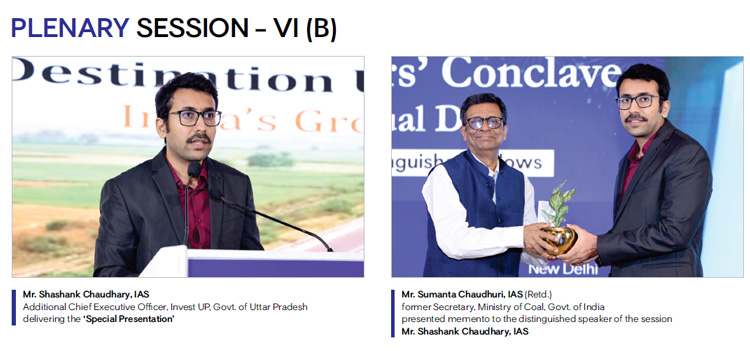
PLENARY SESSION - V (B)
‘Special Presentation’ on Investment Opportunities in the State of Uttar Pradesh by:
Mr. Shashank Chaudhary, IAS
Additional Chief Executive Officer, Invest UP
Govt. of Uttar Pradesh
Mr. Chaudhary, highlighted the vast investment opportunities in Uttar Pradesh, positioning the state as an emerging investment destination. Key advantages include the upcoming airport and inland waterways projects, robust logistics infrastructure, demographic strengths, a thriving startup ecosystem, and a strong industrial base with a special focus on sectors such as ESDM, chemicals, fintech, and pharmaceuticals, among others.
He highlighted the state's recognition as an 'Achiever State' in the LEADS Survey 2024 and as a 'Top Achiever State' in the Ease of Doing Business rankings in 2022. Responding to the question on “Why Invest in UP?”,
Mr. Chaudhury answered by highlighting their efficient digital Eco- system-'Nivesh MITRA', 'Nivesh Sarthi', and the Online Incentive Management System'. He concluded his address by encouraging investors and new companies to explore the attractive incentives offered by the state and to collaborate in driving India's growth story forward.
This was followed by a Networking Reception for all the assembled delegates, experts, and business & industry representatives.
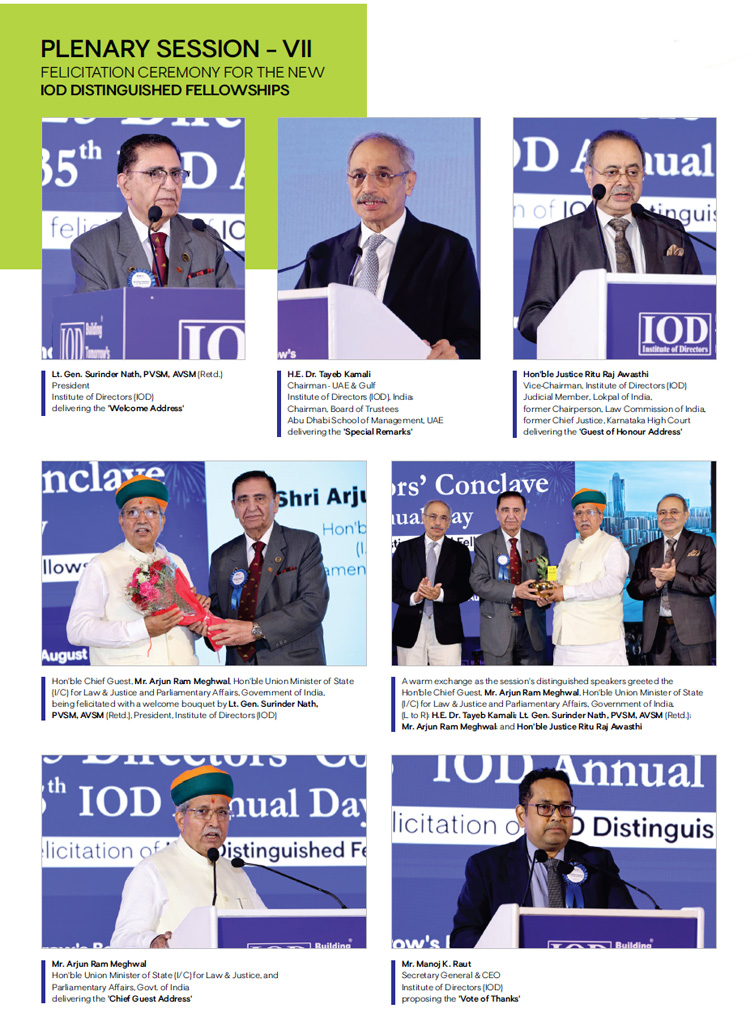
PLENARY SESSION - VII
FELICITATION CEREMONY FOR THE NEW IOD DISTINGUISHED FELLOWSHIPS
The 'Welcome Address' was delivered by:
Lt. Gen Surinder Nath, PVSM, AVSM (Retd.)
President, Institute of Directors (IOD)
Lt. Gen. Nath, opened the evening session by welcoming the Chief Guest of the Conclave, Shri Arjun Ram Meghwal, Union Minister of State (Independent Charge) for Law & Justice and Parliamentary Affairs, Govt. of India, the Guest of Honor, Hon'ble Justice Ritu Raj Awasthi, Judicial Member of the Lokpal of India, former Chairperson of the Law Commission of India, and former Chief Justice of the Karnataka High Court, and H. E. Dr. Tayeb Kamali, Chairman UAE & Gulf, Institute of Directors (IOD) and Chairman, Board of Trustees, Abu Dhabi School of Management, UAE. He also marked a milestone in IOD's 35-year journey, dedicated to fostering ethical leadership, corporate integrity, and the adoption of global best practices in day-to-day governance.
He highlighted the celebration and recognition of the eminent IOD Distinguished Fellows 2025, honoured for their exceptional contribution to public life, business, governance, and the judiciary. Reflecting on IOD's rich legacy, he fondly recalled its first Distinguished Fellow, (late) Dr. APJ Abdul Kalam, who was the then Head of DRDO, and subsequently went on to become the President of India.
The 'Special Remarks' were delivered by:
H.E. Dr. Tayeb Kamali
Chairman - UAE & Gulf, Institute of Directors (IOD)
Chairman, Board of Trustees
Abu Dhabi School of Management, UAE
H.E. Dr. Kamali warmly congratulated IOD on completing its 35th anniversary, attributing its success to the vision of its Founder and the dedication of all those who have contributed along the way. Reflecting on his own association with IOD for over a decade, he spoke of his deep appreciation for the organization's unwavering commitment to promoting ethical governance and leadership at the highest levels. He concluded by extending a heartfelt congratulations to the IOD Distinguished Fellows and Life Members who were felicitated, publically recognizing their exceptional contributions and the excellence towards ethical governance and leadership.
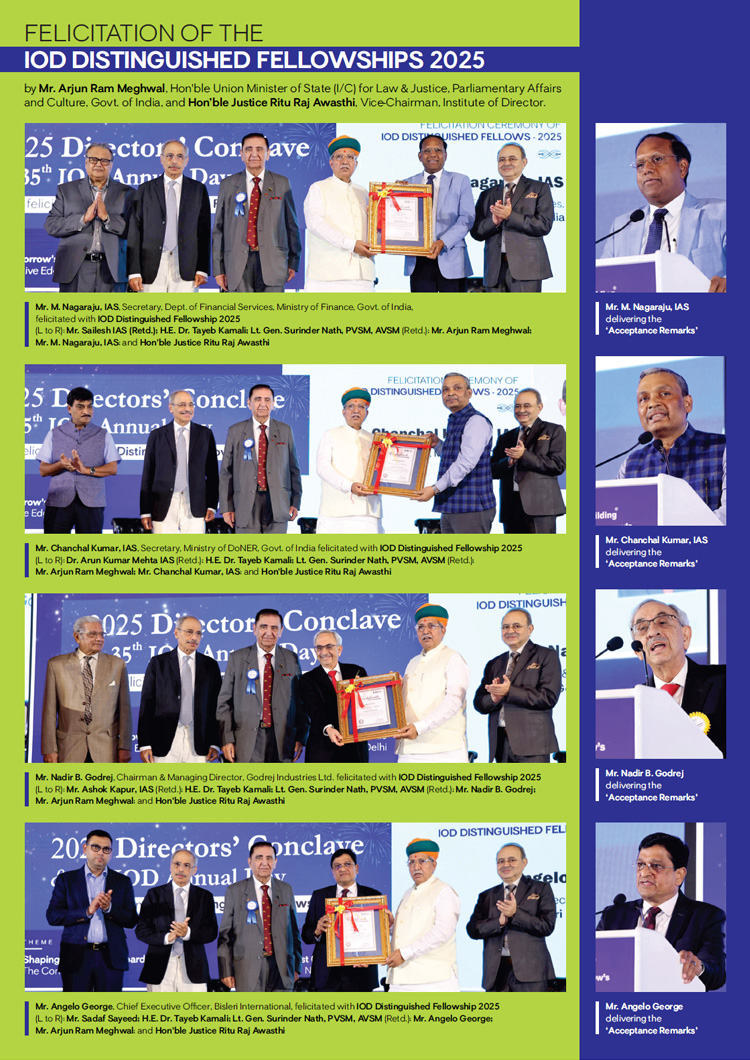
The 'Guest of Honour Address' was delivered by:
Hon'ble Justice Ritu Raj Awasthi
Vice-Chairman, Institute of Directors (IOD)
Judicial Member, Lokpal of India
Former Chairperson, Law Commission of India
Former Chief Justice, Karnataka High Court
Hon'ble Justice Awasthi, invoked Swami Vivekananda's memorable words, “take up one idea and make that one idea your life, think of it, dream of it, let every part of the body be full of that idea and just leave every other ideas alone-this is the way to success', and this idea he added continues to echo in our boardrooms and our collective aspirations”, emphasizing that this principle continues to resonate in boardrooms and collective aspirations. He extended warm regards to the dignitaries and commended IOD for 35 years of excellence in advancing robust governance and ethical leadership. He hailed IOD as a Lighthouse shaping governance culture and nurturing future leaders, aligning with the event's theme that the strength of the future lies not merely in economic growth but in integrity, transparency, and intent. He underlined that business and industry today are not isolated engines of prosperity but architects of societal well-being and stewards of public trust.
Acknowledging the judiciary's role in reinforcing accountability and transparency, he noted that its landmark rulings have ensured the 'Rule of Law' remains a living practice that safeguards fairness, investor interests, and public trust. He concluded by congratulating the Distinguished Fellows and the LIFE Members for their exemplary contributions and their relentless pursuits of societal good.
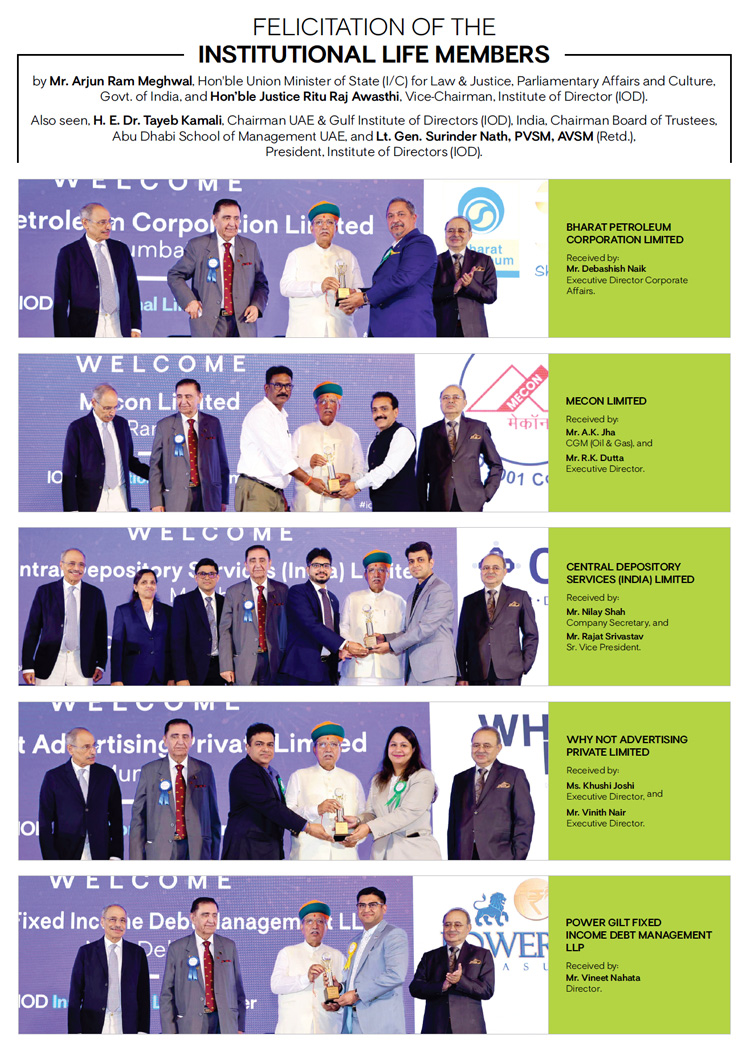
This was followed by the Felicitation of the IOD Distinguished Fellows 2025.
The 'Presenters' were:
1. Mr. Sailesh, IAS (Retd.)
Senior Strategic Advisor, Institute of Directors (IOD)
former Member, Public Enterprises Selection Board (PESB)
2. Dr. Arun Kumar Mehta, IAS (Retd.)
former Chief Secretary
Govt. of Jammu & Kashmir
3. Mr. Vijay Karia
Advisory Council Member, IOD Chairman & MD
Ravin Group of Companies
4. Mr. Sadaf Sayeed
Chief Executive Officer
Muthoot Microfin Limited
This was followed by Felicitation of the IOD’s Institutional LIFE Members.
The 'Chief Guest Address' was delivered by:
Mr. Arjun Ram Meghwal
Hon'ble Union Minister of State (I/C) for Law & Justice, and Parliamentary Affairs, Govt. of India
Mr. Meghwal congratulated the IOD on completing its 35 years of Excellence in advocating Corporate Governance in the overall Indian corporate landscape. He further extended his heartfelt congratulations to the distinguished IOD Fellows and LIFE Members who were felicitated during the ceremony.
Reflecting on the various stages of global industrial revolutions, he noted that India has now entered the era of Industry 4.0, emphasizing the importance of the 'Alternate Dispute Resolution Mechanism' (ADRM), he posed a very pertinent question: “How can we ensure effective checks to move the country's economy forward?”
He also touched upon the ongoing significance of the human element, even amidst the rapid rise of technology and AI. While AI, robotics, machine learning, and other advancements have become an integral part of our lives, he concluded by reminding all that we must never overlook or abandon the human touch.
The 'Vote of Thanks' was proposed by:
Mr. Manoj K. Raut
Secretary General & CEO
Institute of Directors (IOD)
Mr. Raut in his 'Vote of Thanks' highlighted the success of the 2025 Annual Directors' Conclave and IOD's 35th Annual Day. He expressed his heartfelt gratitude to all the assembled dignitaries, speakers and delegates for their deep insights and the vibrant panel discussions that made the event impactful, highlighting their relevance amid global challenges such as geopolitical shifts, trade tensions, climate risks, and technological disruptions.
He congratulated all the recipients of the IOD Distinguished Fellowship 2025, who were present, applauding their exemplary leadership and contribution to the industry and society. His address also underlined India's growing strategic and economic influence globally, calling for boardroom leadership that is agile, ethical, diverse, and future-ready. Appreciation was also extended towards the partners, supporters, media representatives, and Hotel Le-Meridien for their support, and to the dedicated IOD team for making the event a success that it was.
He concluded with the thought- “The most effective boards are not those that predict the future, but those that are best prepared for it”, and urged everyone to carry forward the Conclave's spirit of shaping Tomorrow's Boards with wisdom and integrity.
To sum up, IOD is especially grateful to its Event Partners for the 35th Annual Directors Conclave.
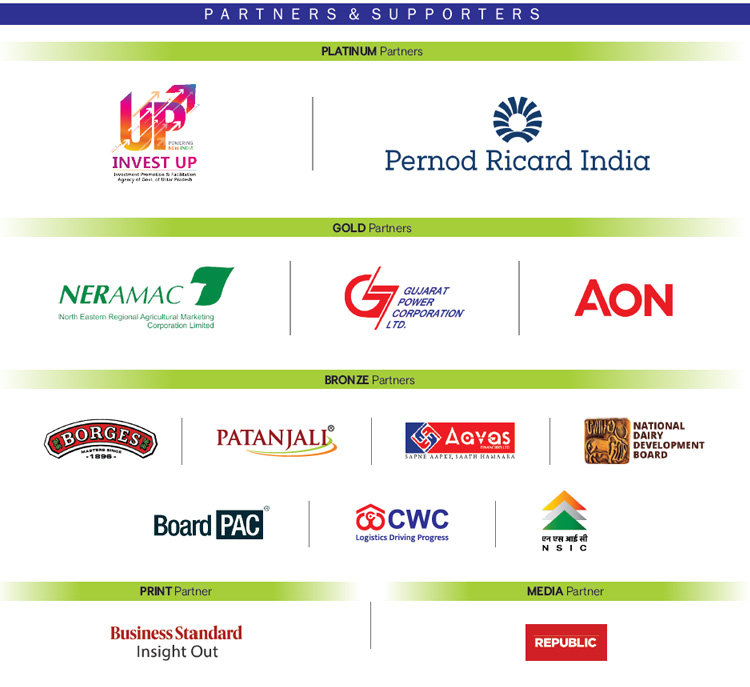
The Platinum Partners:
• Invest UP, Government of Uttar Pradesh
• Pernod Ricard India
The Gold Partners:
• North Eastern Regional Agricultural Marketing Corporation Limited (NERAMAC)
• Gujrat Power Corporation Ltd., Ahmedabad
• AON Consulting
The Bronze Partners:
• Borges India
• Patanjali Ayurveda
• Aavas Financiers
• National Dairy Development Board (NDDB)
• Central Warehousing Corporation (CWC)
• National Small Industries Corporation Ltd. (NSIC)
• BoardPAC
The Print Partner:
• Business Standard
The Media Partner:
• Republic TV
The Conclave was also covered by Doordarshan TV channel the following week.
This report is compiled by:
Mr. Ashok Kapur, IAS (Retd.)
Director General - Institute of Directors (IOD)
and
Ms. Violina Das
Assistant Manager – Editor & Communications
Institute of Directors (IOD)
Supported by:
CS Sana Rehman
Executive Editor – Director Today
Institute of Directors (IOD)
Author

Institute of Directors India
Bringing a Silent Revolution through the Boardroom
Institute of Directors (IOD) is an apex national association of Corporate Directors under the India's 'Societies Registration Act XXI of 1860'. Currently it is associated with over 31,000 senior executives from Govt, PSU and Private organizations of India and abroad.
Owned by: Institute of Directors, India
Disclaimer: The opinions expressed in the articles/ stories are the personal opinions of the author. IOD/ Editor is not responsible for the accuracy, completeness, suitability, or validity of any information in those articles. The information, facts or opinions expressed in the articles/ speeches do not reflect the views of IOD/ Editor and IOD/ Editor does not assume any responsibility or liability for the same.

 Quick Links
Quick Links
 Connect us
Connect us




 Back to Home
Back to Home









